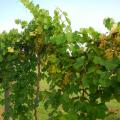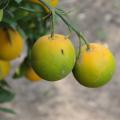Are apricots grown in Mississippi?
The apricot is believed to be a native of western China. Apricot cultivars grown in Russia are winter hardy and require moderate chilling for normal bud development. After a cold winter that has satisfied the chilling requirement of both species, apricot flowers bloom earlier than those of the peach. Therefore, apricots are more likely to be damaged by frost than peaches are. Following a relatively mild winter, more apricot flower buds abscise than those of peach.
This inherent characteristic to bloom early limits the area where the species can be grown commercially to places that are relatively free of late spring frosts. Apricots are also not grown where spring rains are prevalent because their flowers are very susceptible to infection by a fungus.
Apricot trees are propagated on Marianna 2624, peach, or apricot rootstock. Marianna 2624 rootstock is a hybrid plum stock that tolerates wet feet better than do peach and apricot seedlings. When the soil is deep and fertile, the trees will become relatively large and should be spaced 18-20 feet apart. Because of severe splitting, apricots should be trained to a modified central leader with adequate vertical distance between branches.
Commercial cultivars are self- and cross-fruitful except for Riland and Perfection, which are self-incompatible and require cross pollination. Spurs develop excess flower buds so that even when all long shoots have been removed, trees are usually thinned in the spring to obtain good fruit size.
Tree ripened apricots are among the most delicious fruits available; unfortunately, they are too soft to be shipped any distance. In order to be shipped by train or truck, fruits are harvested at a firm ripe stage before they develop their fine, rich flavor. Two new, early-ripening cultivars, Castlebright and Pinkerton, are firm-fleshed and highly acidic, and they develop a deep orange color, but they lack flavor. They are replacing Stuart and Derby for the fresh market trade. Blenheim (syn. Royal) and Tilton, which ripen in midseason or later, are marketed as fresh fruits, or processed as frozen, canned, or dried fruits. Blenheim is the preferred cultivar for its dessert quality, but it is soft and does not ship well. Patterson and Modesto, because of their color and quality, are replacing Tilton. White-fleshed, clingstone cultivars are grown for the fresh market and processing in the Balkan states.
To succeed in growing apricots, well drained, fertile soil is important as well as copper fungicide sprays in the fall and spring. To delay the frost sensitive bloom, try planting on the north side of a building, or near tall evergreen shrubs where winter sun will not warm them, but where they will get full sun in the summer. Apricot's fruit on spurs that bear for about four years, so pruning for new wood should not be as drastic as for peaches. They also do not get leaf curl but the same sprays help prevent brown rot and blights, which they do get.
Publications
News
RAYMOND, Miss. -- This year, Julie Bounds was expecting a bumper crop of blueberries. What she could not anticipate was the excess amount of rainfall her family’s blueberry farm would receive. This untimely rain has been the biggest challenge for growers across the state.
Fruit production requires considerable effort, and some fruits require much more care than others -- facts specialists with the Mississippi State University Extension Service keep in mind as they provide research and information support to the industry.
MSU has ongoing blueberry research at the South Mississippi Branch Experiment Station in Poplarville and the Beaumont Horticultural Unit, and muscadine research at Beaumont and the McNeill Research Unit. MSU also has trials and research on blackberries, wine grapes, elderberries, passion fruit and strawberries.
RAYMOND, Miss. -- A statewide citrus quarantine was issued recently for Mississippi after one of the most serious citrus plant diseases in the world was detected in the state. Citrus greening, also known as Huanglongbing or HLB, was confirmed earlier this year, according to a press release from the U.S. Department of Agriculture’s Animal and Plant Health Inspection Service, or USDA APHIS. There is no cure for the disease, which is caused by a bacterial infection spread by the Asian citrus psyllid, a gnat-sized insect. Infected trees die within a few years.





